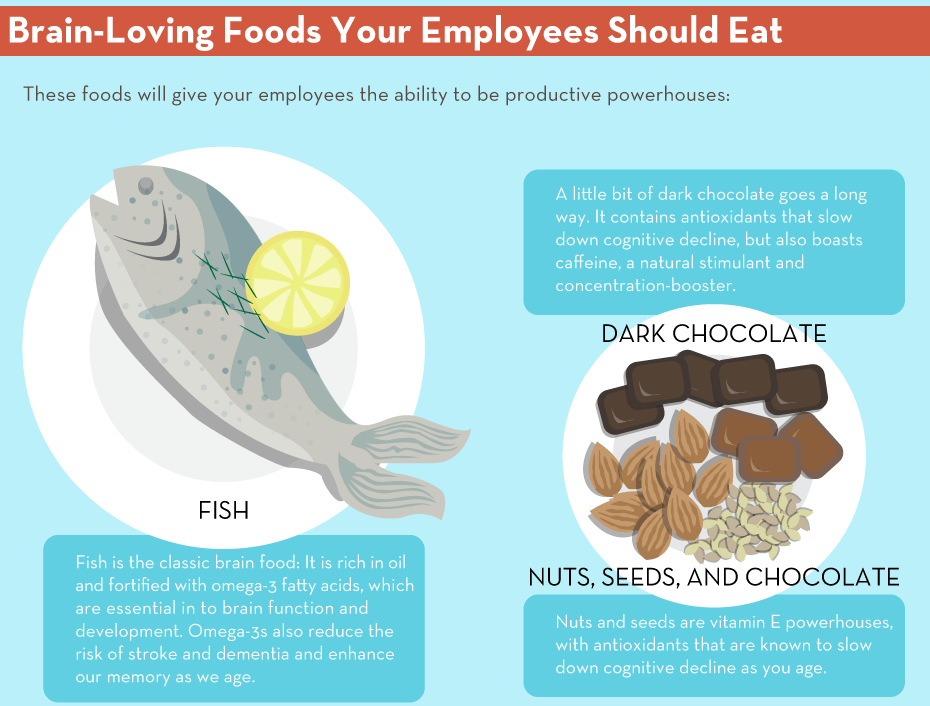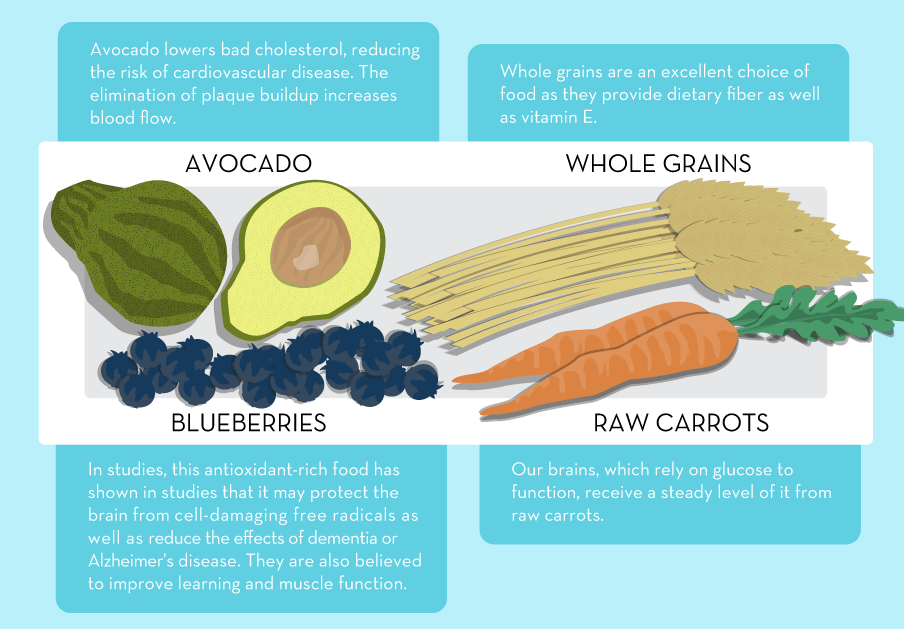Every 7 years our body will change completely. This means that each and everyone of your cells will have been renewed and exchanged for another one that your body has produced. I was always amazed by this. And science suggests that this gives us a unique chance to change and erase any mistakes we’ve made in the past. How? Through a focus on the food we eat.
Fortunately we don’t have to wait 7 years. Day-to-day changes to our diet can have a massive impact on our productivity. Something like this:
“Adequate nutrition can raise your productivity levels by 20 percent on average.” ~ WHO
When I grew up, there were tons of cliché wisdoms thrown at me. Eat at least 5 different fruit every day. Drink plenty of water. Eat 3 separate meals every day. Do this , do that, that’s “healthy”. I realized recently that most of this I’ve just taken for granted and never looked into it.
Whilst we have uncovered the 2 other major factors that contribute to your productivity, explaining how much sleep we really need and how science looks at the impact of exercise on our brain, it’s time to tackle the probably hardest and most ongoing challenge we all face: nutrition.
How foods interact with your brain
One of the most fascinating things about eating is how various ingredients enter your brain through your blood stream. Whichever elements make it through to power your brain will help you to either focus or lose focus.
Most of what we eat will be broken down to one thing: Glucose. Glucose is our fuel, keeping our brains awake and alert. So at all times, we have a certain glucose level in our blood, kind of like gasoline in a car.
The most important part here is that we are in full control of how we release glucose to our blood and our brains. Certain foods release glucose quickly, whilst others do so more slowly, yet sustainably. For your brain researcher Leigh Gibson found this to be optimal:
“The brain works best with about 25 grams of glucose circulating in the blood stream — about the amount found in a banana.”
And this is the tricky part: the way you can get those 25 grams of glucose into your blood stream is pretty easy. You can eat a donut. Or you can eat a small bowl of oats. There is virtually no difference in the very short term for your brain activity.
Over the stretch of a normal 8 hour day however, the differences are spectacular. After eating the donut, we will release glucose into our blood very quickly. We will have about 20 minutes of alertness. Then our glucose level will drop rapidly, leaving you unfocused and easy to distract. It’s like putting the foot down on the gas pedal until you’ve used all your fuel.
The oats on the other hand will release their sugar as glucose much slower. This means we will have a steady glucose level, better focus and attention levels. Another important factor are your Leptin levels. Leptin will signal to your brain how full you are. If you are now guessing that a donut won’t signal your brain to be full for a long time, whilst oats will, well, you are right:
What we are also measuring here as the difference between a donut and a bowl of oats is called your “glycemic index”, coined by the Franklin Institute:
“Foods with a low glycemic index number gradually release glucose into your bloodstream. This gradual release helps minimize blood sugar swings and optimizes brainpower and mental focus”
In fact, the lowest glycemic index of all comes from Soy, at only 18 and the highest comes with white rice of 88 or jelly beans at 80. Thorin over at Lifehacker also looked into some more longterm insights of how eating affects your brain.
What really matters with eating: when, where, and who you’re with
That’s funny now. We’re going through all this stuff about blood streams and brain fuelling only to find out it doesn’t actually matter?
Rest assured, it still matters, yet the context of when, where and with whom we eat has an equally powerful impact on our eating activities and hence our creativity.
Let’s start with the “when”. The most important part here, is that you make sure you are never hungry. To put this better: Hungry judges give in fact harsher sentences.
For our case, being hungry, or skipping breakfast can ruin several hours of your productivity until you get your first bite. Let’s take a look at this study:
All the children in a class were told to skip breakfast one morning, and then, by random assignment, half of the children were given a good breakfast at school. The others got nothing. During the first part of the morning, the children who got breakfast learned more and misbehaved less (as judged by monitors who didn’t know which children had eaten). Then, after all the students were given a healthy snack in the middle of the morning, the differences disappeared as if by magic.
Eric Barker, one of the best productivity and lifehack bloggers out there, put it like this:
“Across the board, yeah, food puts you in a better mood. To be more exact, research has shown that 2 cheeseburgers = one orgasm.”
Using context to control your eating is one of the most important aspects. If you are like me, you always end up eating portions that are too big, which makes me overly full at lunch and very tired a few hours afterwards.
One of the best proven techniques here is to eat from a smaller plate. Why? Because Delboeuf has told us so a long time ago with his illusion experiment of thinking the right circle looks bigger:
The portion on the smaller plate will always fill you up more. This can make the difference of 1 hour of productivity gained each day, simply by reducing the size of your plate and being less full. Joining the small plate movement is definitely something worth trying.
Another aspect comes in regarding the people you are with as Barker points out:
“Eating with overweight friends? You’ll eat more. Is your waitress overweight? You’ll eat more. Are you a woman eating with a man? You’ll eat less. Wide variety of food? You’ll eat more.”
3 most important aspects to get the most out of eating food
It’s time to get our hands dirty. I think we’ve got a basic understanding of how food determines our daily productive output. But what are the best ways forward to act on this information?
- Reorganize the positioning of food stored in your cupboard: One of the most interesting aspects about eating is that we are extremely likely to eat what is in close sight. In fact famous researcher Brian Wansink mentions that “You are 3 times more likely to eat the first thing you see in your cupboard than the fifth thing you see.” Make sure you organize your food in way that brain powering foods get more exposure. It’s an incredible trick to start eating better food that will give you more daily alertness.
- Learn to graze: From the first section in this post, we’ve learnt that the brain needs very specifically portioned amounts of food. Too much will give you a spike that rapidly declines. Too little won’t bring your brain up to speed. A great way to go about it, I’ve found, is to make your 3 daily meals a bit smaller (potentially by making the plates smaller). And then add 2 very specific, healthy snacks in between meals to keep your brain plugging away at full speed. This way you don’t have to change your core habits too much, yet can still fuel up your brain more efficiently.
- These foods will give your brain the most power: For the whole post, we haven’t actually looked into which kinds of foods you should consume specifically. Here is a great list of brain powering foods, that you can eat, especially for snacking. The WHO particularly emphasizes the following: Dark Chocolate, nuts, seeds; Nuts, seeds, chocolate; Fish

Some further brain powering foods are the following: Blueberries, Raw Carrots, Whole Grains, Avocado

Quick last fact: What you eat will also decide your grandchildren’s productivity
As a last quick tip, here is something that blew my mind. Yes, what you eat will affect your productivity today. But even more so, it will also determine the productivity of your children and grandchildren’s productivity:
“Evidence indicates that what you eat can affect your grandchildren’s brain molecules and synapses,” Gómez-Pinilla said
What you eat, can according to Gomez-Pinilla rewire your genes, and the more you strengthen the synaptic connections, the better your kids and their kids will perform.
I always had the opinion that I should mostly focus on what I’m eating. Looking into some of these studies, it now seems stupidly obvious to put equal amount of focus on the context of where, with whom and when I’m eating. What were your findings when it comes to improving your productivity through diet? I’d love any thoughts you have in the comments below!
Try Buffer for free
190,000+ creators, small businesses, and marketers use Buffer to grow their audiences every month.